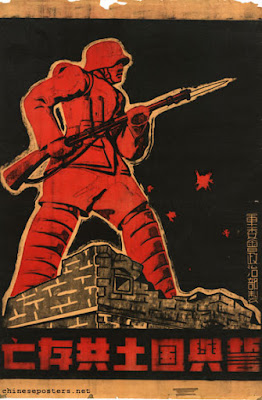Whenever I'm not working and have some free time I like to
read. I love to engage ideas and usually I engage enough to make a post out of
it. In this case I couldn't make it to page 3 of this book (The
Choice of War: Iraq and the Just War Tradition) before I found a howler.
This author claims that Sunzi "laid great stress on moral aspects of
war" as proof the author cites the claim of Sunzi (using an old
translation), “to win without fighting.”
I was so ready to pounce on this incorrect statement I reminded myself of the Office character Dwight Schrute yelling “false.” Sunzi's admonition wasn't out of
some moral, pacifistic desire to avoid war. But an amoral desire to avoid
costly conflict. His amoral teachings were one reason why Confucians really
didn’t like him. His desire to avoid battle was somewhat similar to the
legalists in worrying about the productivity of the soon to be conquered
province. Dead men don’t pay taxes, burnt farms can’t supply soldiers, and thus
the cost of men and material spent in even a victorious battle was astounding
and the legalists wanted to avoid costly battle for that reason.
Sunzi did advise the invading army to seek profit as a way
to entice the enemy into battle,[1]
(or hopeless prebattle position), and take provisions from invaded territory to
lower the cost of war. But these measures were mostly applied to lowering the
cost of the invading army. He didn’t talk about ways to incorporate the
province and quickly it make it a profitable part of the empire. For example, one
of the lesser-known writers of the Seven Military Classics said of the
conquered territory: “do not destroy material profits nor agricultural seasons,
be magnanimous towards his government officials, stabilize people’s
occupations, and provide relief for the impoverished.”[2]
Notice the last line that seems in almost direct contradiction
of Sunzi. It said to provide relief to the impoverished, while Sunzi advised
armies to literally plunder them. The treatment of the people is a huge factor
that distinguishes Sunzi from others. My
book had three chapters on this subject because it was visited so often and
in so many variations by classical Chinese theorists. But outside of a perfunctory
statement about winning the people, Sunzi’s writing often relied on pure
calculation, force, profit, and throwing soldiers into places which they cannot
fleet to stimulate the greatest effort.
His first line is that warfare is the greatest affair of
state, which ignores the second part quoted by most Confucians about protecting
the altars of the ancestors.[3]
As one writer said, “When a state loses its priorities, the altars of soil and
grain will be wronged.” [4]
Sunzi instead spoke mostly about tactical positional advantage (designed to
produce victory without battle) and not about the Mandate of Heaven,
righteousness, or benevolence. He discussed calculations in the temple, but
only to assess the prospects of victory, not to pray or invoke Heaven's favor.
Sunzi's theories were criticized by thee Confucian Xunzi as
tactics for a bandit army and day laborers, or like stirring boiling water with
a finger.[5] Even
Wuzi, a fellow military writer often lumped in with Sunzi thought bandit armies
that pursued profits were a weakness that could be exploited. He said that armies
based on rewards ‘’scatter and individually” engage in combat, and when enticed
with profit “will [greedily] abandon their generals to pursue it.”
Sunzi’s statement about avoiding the loss of life was not a
moral high ground. But the results of base temporal concerns like profit and
greed. It was disheartening to read such a major mistake so early in the book,
and in print which means it got by an editor. But quoting Sunzi is an easy way
to spice up a piece and few people know better so everyone from editors, to readers,
and generals just go with it. I’ve seen bad quotes and interpretations from the
financial
review a Master’s
thesis, and even General
Petraeus. His terse writing and simple profundity lend itself to a wide
variety of interpretations. But when compared to dozens of other classical
writers a reader can better understand his theories and eliminate the bad
interpretations such as Sunzi having some kind of moral objection to slaughter.
I work as a free lance author. If you found value in this ad free, high quality, research please consider donating using the pay pal button below, or buying one of my books linked in the top left, particularly Beyond Sunzi: Classical Chinese Debates on War and Statecraft.
[1] “Thus
what [motivates men] to slay the enemy is anger; what [stimulates them] to seize
profits from the enemy is material goods.” And, “With profit [the general]
moves them” Ralph Sawyer trans., The Seven Military Classics of Ancient
China: Sunzi (Westview Press, 1993), 160, 165.
[2]
Sawyer, Wei Liaozi, 273.
[3] Sawyer,
Tai Kong, 64-65.
[4] Five Lost Classics: Tao, Huanglao, and
YingYang in Han China, Robin Yates trans., New York City, Ballantine
Books, 1997.
[5] Basic Writings of Xunzi, Burton Watson trans., (Columbia University Press, 1963,) 64.
[6]
Sawyer, Wuzi, 210.








